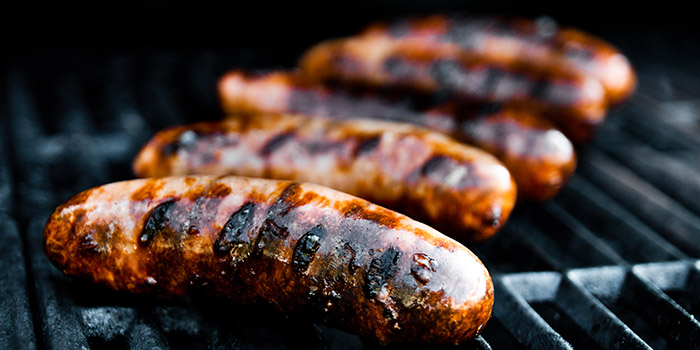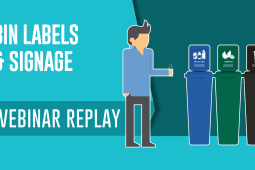Serving up Sustainability at this Summer’s BBQ – A How-To Guide
Nothing screams “summer” like a barbecue. The smell of good food cooking on the grill, the company of friends and family, and the long summer evenings spent are all characteristics that keep this gathering alive and well. Though there is nothing wrong with enjoying yourself and relishing in the good times, some of our actions at these events can take their toll on the environment.
It is important that, when we are celebrating during this warm season, we don’t forget about the environment, and we make some small effort to make sure that our get-togethers are also sustainable. Whether you’re with a small group or a big crowd, here are some ideas to make sure that one of the things you’re serving at your next barbecue is sustainability.
‘Tis the Season to Buy Local
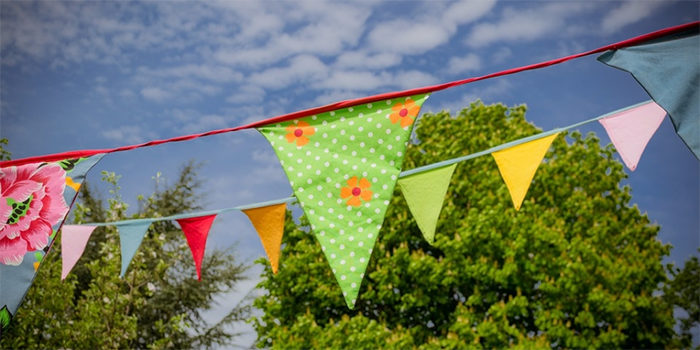
One great way to reduce your carbon footprint is to buy food locally and in season. The average food item travels 745 miles (1,200 km) to get to your barbecue, which means trucks traveling long distances and spewing carbon dioxide (CO2) into the atmosphere. Buying local means that the food items, whether it be meat or vegetables, haven’t had to travel far.
Buying seasonal vegetables also ensures the freshness of the product, meaning that they have been grown to their proper ripeness and are at their peak flavor. It may be a little harder as you’ll have to look around a bit, but it’ll be worth the hunt. Try visiting your local farmer’s market for what’s fresh and tasty for summer.
Buying seasonal vegetables also ensures the freshness of the product, meaning that they have been grown to their proper ripeness and are at their peak flavor. It may be a little harder as you’ll have to look around a bit, but it’ll be worth the hunt. Try visiting your local farmer’s market for what’s fresh and tasty for summer.
Know Your Grill
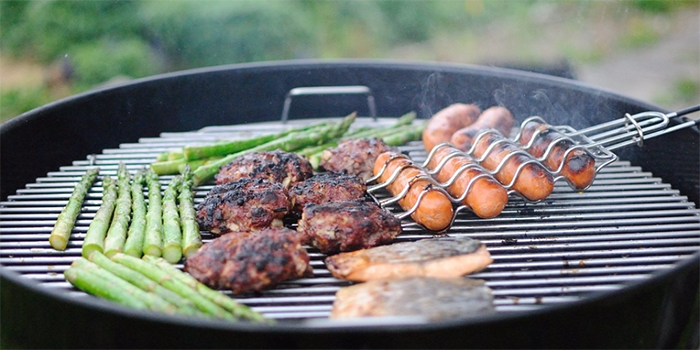
The star of your party isn’t that piece of steak that you’ve been marinating for 24-48 hours, fancy margarita mix that you make for every party, or even that dip that only comes out once a year – it’s that flaming grill that you cook on in the summer!
When picking your barbecue, it pays to do your homework. You not only need to consider size, how often you plan on using it, or how many people it’s going to feed, but also about the fuel you’re going to use to power this cooking machine. The traditional method of using charcoal emits harmful CO2 into the atmosphere but if you are a hard-bound traditionalist in the art of barbecue, try using charcoal that is organic or in natural lump form, these emit one hundred times less CO2 than the conventional kind.
An even better option would be to look for alternative fuel sources such as propane, which burns much better than natural gas, or look into other types such as electric (though it depends on the energy producing source) or a hybrid model that utilizes both charcoal and electricity.
Some Smart Drinking
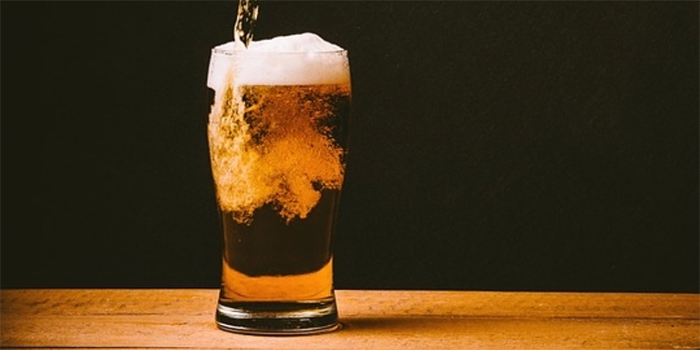
When you’re having a barbecue on a hot, summer day, a cold beer or icy drink can be quite refreshing. For those not inclined to alcohol, infused water is a great and refreshing treat to enjoy, and the remaining fruit can be composted after the party.
If you are in the mood for a cold one, try buying bottles or something locally produced. While cans are lighter and can be reused more easily than bottles, the latter can be reused more quickly and don’t contain bisphenol-A (BPA) as a lining. For more info on if bottles or cans are the best choice, check out our blog post on the topic here.
Much like buying locally produced vegetables, locally produced beer doesn’t have to travel very far to get to your party, and you’re supporting your community while gearing up for a magnificent time.
Don’t Hate, keep the Plate
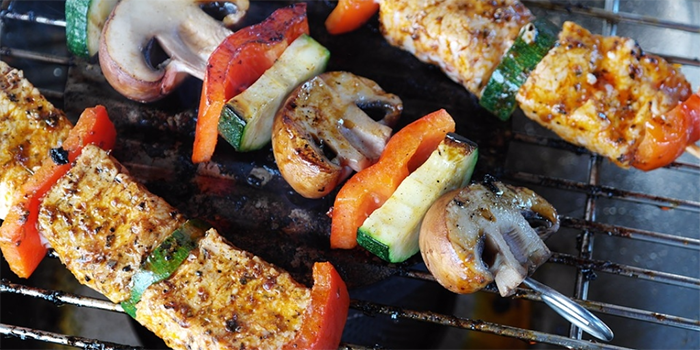
With the annual summer barbecue comes lots of people, meaning tons of dishes. The easiest answer would be to buy a pack or two of disposable plates, plastic cups, and plastic forks and knives from the store. Though a quick fix, these often find their way into the landfill and can mean more harm to the environment.
The ideal solution would be to have reusable plates and utensils since you only need to clean them and put them aside after. But let’s be honest, no one wants to have to think about extra cleaning after the party! An alternative would be to buy disposables that are made from recyclable products or ones that are biodegradable.
These options are a great alternative to the usual disposables and will guarantee that the waste you have will be disposed of in a greener manner.
![]()
Sources
“Eco-Friendly Grilling.” Kashi. https://www.kashi.com/natural-living/progressive-nutrition/eco-friendly-grilling. June 21, 2016.
“What’s better for the Environment – Beer in cans, or bottles?” David Suzuki Foundation. http://www.davidsuzuki.org/what-you-can-do/queen-of-green/faqs/recycling/whats-better-for-the-environmentbeer-in-cans-or-bottles/. Accessed June 20, 2016.
cwdavis3. “Secrets of a Sustainable Summer Cookout.” NC State Sustainability. June 09, 2014. https://sustainability.ncsu.edu/changeyourstate/secrets-sustainable-cookout/. Accessed June 21, 2016.
Drugay, Andrea. “Green Your BBQ: 10 Tips for an Eco-Friendly Cookout.” The Good Shopper. https://blog.goodshop.com/2016/05/27/green-your-bbq-10-tips-for-an-eco-friendly-cookout/. Accessed June 21, 2016.
Helsabeck, Hannah. “Your Summer Guide to a Healthy Summer.” Huffington Post. http://www.huffingtonpost.com/hannah-helsabeck/your-summer-guide-to-a-healthy-and-eco-friendly-bbq_b_7571576.html. Accessed June 21, 2016.
Monserrat-Howlet, Mary. “Eco-friendly Barbecue for a Green Summer.” Reader’s Digest. http://www.readersdigest.ca/food/cooking-tips/eco-friendly-barbecue-green-summer/. Accessed June 21, 2016.
![]()
